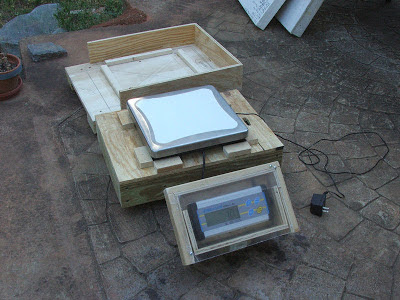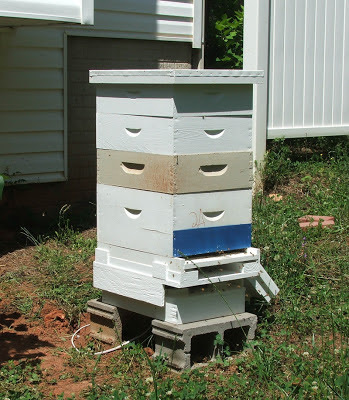GBA Monthly Newsletter
Editors: Gina
Gallucci and Linda Tillman
Noah Macey, Georgia’s
youngest Journeyman beekeeper, working on his top bar hive (Photo by Julia Mahood)
Message from our
President: Jerry Edwards
November brings families and friends together to celebrate living and giving thanks for the blessings that touch us all. Among my bag of diverse blessings is the privilege to serve as president of the GA Beekeepers. My first official duty, outside of the club's business, is to be a speaker at the Georgia Farm Bureau's annual meeting in Jekyll Island this December on the topic of "Beekeeping in Georgia." It is of utmost importance that all issues regarding this subject are discussed so I am asking for your input about topics that should be mentioned. Please email your ideas to presidentGBA@aol.com.
Jerry Edwards, President of GBA Saving the world, one bee at a time
______________________________________________
Hello Folks,
This is a note for anyone not able to attend the last meeting
of GBA. When you miss these meetings you
really miss some knowledgeable speakers.
Some speakers have some very valuable information to share.
Wyatt Mangum PhD was such a
speaker. I personally got to know Wyatt and was able to spend some quality time
with him. He is one of the most
observant beekeepers that I have known.
A few years back, after a meeting, I was taking him the train station
for his return home. During the meeting
a young lady had asked about a problem with her hive. Wyatt suggested that we
stop on the way to the station to check out her hive.
On arrival we removed the top and he
instantly realized that the hive had 2 queens. Sure enough he was right! We saw both queens and he asked the lady if
he could have one to take back to his Bee Building with all his observation
hives. He pulled a queen cage from his pocket, placed the queen in it and we
left. In our conversation he made the statement that he would not publish anything
without photographic backup. Wyatt is
one of the most interesting individuals I have had the pleasure of getting to
know.
See you at the Spring Meeting,
P.N. Williams
PN and Evelyn Williams
(Photo by Linda Tillman)
______________________________________________
"Winnie the Pooh: Christopher Robin, I think the bees S-U-S-P-E-C-T something.
Christopher Robin: Perhaps they think you are after their honey.
Winnie the Pooh: Well, it may be that. You never can tell with bees."
--A. A. Milne from Winnie the Pooh and the Honey Tree.
______________________________________________
New Local Beekeeping
Associations in Georgia
By Virginia Webb
This year the GBA
welcomed 2 new local beekeeping associations in Georgia. The Appalachian
Beekeepers Association and the Lake Hartwell Beekeepers.
This brings the number of local beekeeping associations in Georgia to 22.
The
Appalachian Beekeepers Assoc. of GA
meets the second Tuesday of each month at the Jasper Senior Center beginning
at 7pm. Bud Champlin is the current president. The Lake Hartwell Beekeepers meets the first Thursday of every
month at 7pm at the First Baptist Church of Lavonia Family Life Center.
Tom Atkins is the president.
As a new local beekeeping
association, the GBA may award each club a onetime start up grant funds up to
$350. Request for funds for a new beekeeping organization must be sent in
writing to the GBA president, and will be approved by the GBA Board of
Directors.
The guidelines for
approval of these funds include:
Elect officers
Hold at least 4 meetings a year
Approve bylaws for the organization
Have a set date for the meetings
Elect or appoint a member in good standing to the GBA Board of Directors
______________________________________________
November Beekeeping Tip
Hive Scale - Computers and Beekeeping
by Steve Page
Paul Vonk was the last speaker at GBA in February, 2012, and I liked his presentation best of all of them. Paul taught us how to set up a hive on a scale with temperature sensors inside and outside the hive. A computer records the weight and temperatures every five minutes 24/7. The data goes to a server and is used to create a graph that is accessed via the Internet.
I set up my hive scale in late April. So you're wondering: What's the deal with putting a hive on a scale????
I can tell when the bees leave the hive and when they all get back home at the end of the day. I can tell when the nectar flow starts and when it ends. During the main nectar flow, the hive would increase six to ten pounds per day. The main nectar flow in my location ended on May 10, 2012. There was a small flow in June which I suspect was sourwood. We have sourwood in Coweta County, but not enough to produce a honey. From sunset to about noontime the next day, the bees were evaporating water out of the nectar. All of this showed up on the scale.
We are now in late October and there is no nectar coming in as the hive is not increasing in weight. So, do we have a fall nectar flow in the piedmont of Georgia? I check the website multiple times a day to see what's happening in my hive.
See the graph below to understand what everything means.
Red: WeightGreen: Ambient temperatureBlue: Inside temperature
Follow this link and click on GA005 for my hive.
Thanks to Scott Griggs for all his help setting up the computer. Thanks to Paul Vonk for getting this whole program up and running. Let me know if you'd like a hive scale also.....
(photos below by Steve Page)
The scale on the platform with the top upside down. I built it so the scale was directly below the center of the hive, reducing the chance of tipping over. The scale is connected to a computer using USB cables.
The hive sits on the scale. Notice the house just a few feet away. The cables go through the wall to a computer in the basement.
______________________________________________
Virginia Webb has let us know that one of our GBA life members, Mr. James (Jim) Burch, 94, of Lula, Georgia, died on November 4. Mr. Burch was an active member of GBA for many years, as well as a leader in the beekeeping community. Services were held on Thursday, November 8.
______________________________________________
"There are a few rules of thumb that are useful guides. One is that when you are confronted with some problem in the apiary and you do not know what to do, then do nothing. Matters are seldom made worse by doing nothing and are often made much worse by inept intervention."
--The How-to-Do-It Book of Beekeeping by Richard Taylor
______________________________________________
Funny Beekeeping Story of the Month:
The Ice Queen
by Noah Macey
As any beekeeper will tell you, keeping an observation hive alive is like multivariable calculus: it's really hard, and I have no idea how to do it. My family keeps trying though, so every year we dust off the glass case and set it up somewhere in the house to await its next set of unfortunate bees.
There are two ways we start up our periodic and unsuccessful hives: choosing a failing queen from our life-sized beeyard or buying a new one. The latter sometimes produces unexpected results.
We had purchased a queen for the observation hive and set her cage inside to let the bees we supplied acclimate to her royal odor. As it seemingly always happens, the workers were unable to eat the candy plug and free her Majesty from the cage, so we took the hive outdoors to release her ourselves.
There are more things that can go wrong when opening an observation hive than there are that can go right; one or more of the following will always happen:
1. You will lose a screw, and the door won't stay shut
2. One of the frames tilts, honey spills out, and bees die
3. Most of the bees escape into the wilderness
4. Every bee in the hive manages to fit on the one inch where the door presses up against the wood, and they all die
5. Thunderstorms
6. Spontaneous combustion
7. The rapture
On this particular occasion, numbers 1 - 5 happened. As we frantically searched for the screw while the clouds rolled in, we noticed the queen was conspicuously absent from the bees in the observation hive. But we released her low on the frame, and, assuming she was hidden in the bottom of the hive, we shut the door triumphantly. The evening drew on, and her Royal Highness did not present herself in the comfort of our living room. Unsure of an alternate explanation, we continued conjecturing that she was recovering from the stress of her release in the nether regions of our observation hive.
In the morning, after a vicious storm that included hail, wind, and (I'm pretty sure) cats and dogs, we stumbled bleary-eyed into the driveway. My dad exclaimed in surprise and pointed at the ground where we had carelessly tossed the queen-cage the night before. Perched on the small wooden rectangle, wet, shivering, and glaring at us with all 9,000 facets of her compound eyes was the queen.
My mother grabbed the cage, ran inside, stuck her in a little side door of the observation hive, and got stung.
We christened her the Ice Queen, and she laid so profusely that her progeny absconded from their diminutive quarters and went to find a new home.....In September. They probably all died.
_____________________________________________
GBA Club of the Month
Five years ago, CEBA ventured into the future by taking advice from Mr. David Reed and observing the success of the Young Harris Beekeeping Institute programs. By chance, Annie Quinting, a teacher at Oatland Island Wildlife Center, was a member of our club. She had the resource of rooms, space, location, and all she needed were the honeybees and CEBA to get an event started.
The FUNdamentals of Beekeeping has experienced over 325+ people attending and learning about beekeeping over 5 years. Our club has grown from 12 members to over 110+. Continuing to meet the needs of so many new diverse beekeepers is a challenge from month to month.
CEBA supported this year’s change to Savannah’s 30 year old beekeeping restrictions, to allow legal bee hives in Chatham County! The Savannah City Council & Mayor are next and we hope to accomplish that this year. So many opportunities for a growing club! But keeping interest at all levels is a big challenge still today.

Diversity in speakers throughout the year can also help keep interest going. Bill Owens, Georgia’s own Master Craftsman joins us at Oatland Island for teaching; local artist from Savannah College of Art & Design demonstrated the art of encaustic painting; and we had Evan Stewart, a 12 year old from Richmond Hill give us a talk on his research concerning CCD.
Regardless of the special speakers during the year, we have found that every meeting needs to have 15-30 minutes for Q & A with the members. Giving members a chance to ask questions about their good and bad experiences is an excellent teaching tool.
Greg Stewart, President, Coastal Empire Beekeepers
______________________________________________
Please save the date. Our GBA Spring Meeting is February 9 and 10, 2013. Location to be announced later.
_______________________________________________
Upcoming Bee Events:
- North American Beekeeping Conference and Tradeshow
- January 8 - 12, 2013
- Hershey, PA
- www.ABFNet.org
- North Carolina & South Carolina State Beekeepers Associations
- Joint Spring Meeting
- March 1 - 2, 2013
- Rock Hill, SC
_________________________________________________
This is your newsletter
Your editors: Gina Gallucci and Linda Tillman






No comments:
Post a Comment